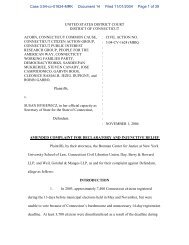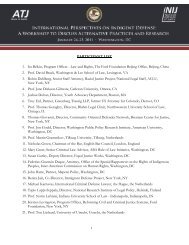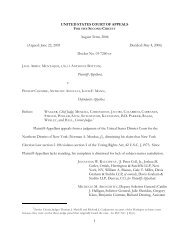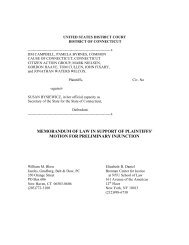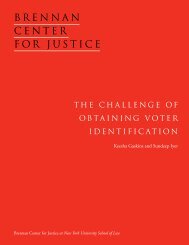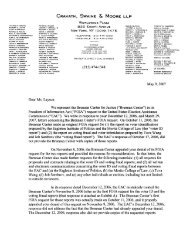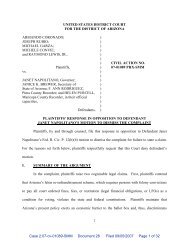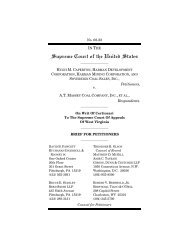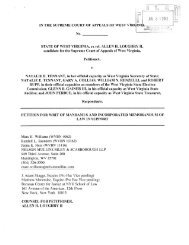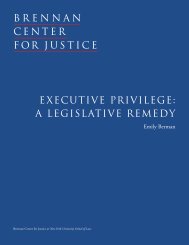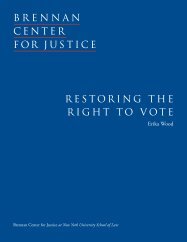THE NEW YORK STATE LEGISLATIVE PROCESS: AN ...
THE NEW YORK STATE LEGISLATIVE PROCESS: AN ...
THE NEW YORK STATE LEGISLATIVE PROCESS: AN ...
You also want an ePaper? Increase the reach of your titles
YUMPU automatically turns print PDFs into web optimized ePapers that Google loves.
x <strong>THE</strong> <strong>NEW</strong> <strong>YORK</strong> <strong>STATE</strong> <strong>LEGISLATIVE</strong> <strong>PROCESS</strong>: <strong>AN</strong> EVALUATION <strong>AN</strong>D BLUEPRINT FOR REFORM<br />
RULES COMMITTEE ROADBLOCKS:<br />
BLOCKING TREATMENT<br />
FOR <strong>THE</strong> MENTALLY ILL<br />
It is difficult to imagine a bill that,<br />
on the merits, would be expected<br />
to pass more quickly than<br />
“Timothy’s Law” (S.5329/A.8301).<br />
The legislation’s namesake was a<br />
12-year-old boy who committed<br />
suicide. Timothy’s death might have<br />
been prevented by psychological<br />
treatment that was not covered by<br />
his insurance and, consequently,<br />
was denied to him. The legislation<br />
would require New York’s health<br />
insurers to cover treatment for<br />
mental illness and drug abuse.<br />
The Assembly has passed Timothy’s<br />
Law, and 33 of 61 senators have<br />
sponsored the legislation in their<br />
chamber. Why hasn’t Timothy’s Law<br />
become law? In 2003, the Senate<br />
Rules Committee (chaired by the<br />
Majority Leader) refused to report<br />
the bill to the full Senate for a vote.<br />
Majority Leader are able to prevent any bill from reaching the floors of their<br />
respective chambers without the certainty of passage and, presumably, without<br />
their support.<br />
Together, these barriers prevent legislators – and their constituents – from obtaining<br />
votes on much-needed legislation by the full Senate or Assembly. They also<br />
exacerbate the limits placed on members of the minority political party in each<br />
chamber – the Democrats in the Senate and Republicans in the Assembly at<br />
present – who seek to represent their constituents and their interests through<br />
legislative action.<br />
■■ PROPOSED RULES CH<strong>AN</strong>GES:<br />
■ If three or more members of a committee petition for a vote on a bill, the<br />
chair shall schedule such vote as soon as practicable in the current legislative<br />
session and in any event no later than ten days before the end of the session.<br />
■ New York’s limits on discharge motions should be relaxed as follows:<br />
◆ Any elected member of the chamber shall be allowed to make a motion<br />
to discharge a bill from a committee, and the sponsor’s agreement shall<br />
not be required.<br />
◆ Motions to discharge shall be allowed at any time after 20 days has<br />
passed since the bill was referred to the committee and until five days<br />
before the end of the legislative session.<br />
◆ There shall be no limit on the number of motions to discharge within a<br />
legislative session.<br />
◆ Debate on a motion to discharge shall not be limited in duration, except<br />
that such debate shall be closed by a majority vote of the elected members<br />
of the chamber.<br />
■ Every bill that is voted out of committee shall be placed on the calendar and<br />
must be considered and voted upon by the full chamber within 60 days, or<br />
prior to adjournment, whichever comes first.<br />
■ All votes on discharge motions shall be taken by slow roll call and the votes<br />
of each member recorded as a public record.<br />
PROBLEM # 3<br />
■ NO DEBATE, NO AMENDMENTS, INADEQUATE REVIEW<br />
In most legislatures, the procedural rules and practices encourage and even<br />
require legislators to read, consider, debate, and amend bills before voting on<br />
them in person. By contrast, New York’s Legislature discourages and even precludes<br />
such deliberative activities by legislators:



